| Cover Story
A Status Symbol Goes Public
Nader Rahman and Elita Karim
 In a developing country such as Bangladesh one of the foundations of development is communication, whether that be by road, air or post. And like any other emerging nation Bangladesh lacks the infrastructure to facilitate proper and meaningful communication between the massive rural and densely populated urban areas. The telephone is therefore considered the easiest means of communication, yet in Bangladesh it suffers from severe problems. The number of fixed land lines is paltry compared with the population, the network they cover is minute and leaves out large portions of rural areas and lastly one must tackle institutional corruption at every level to buy a phone line legitimately (ironic isn't it). Only recently has there been a way out of the mess and that has been with the help of mobile phones. In a developing country such as Bangladesh one of the foundations of development is communication, whether that be by road, air or post. And like any other emerging nation Bangladesh lacks the infrastructure to facilitate proper and meaningful communication between the massive rural and densely populated urban areas. The telephone is therefore considered the easiest means of communication, yet in Bangladesh it suffers from severe problems. The number of fixed land lines is paltry compared with the population, the network they cover is minute and leaves out large portions of rural areas and lastly one must tackle institutional corruption at every level to buy a phone line legitimately (ironic isn't it). Only recently has there been a way out of the mess and that has been with the help of mobile phones.
 Nobel Laureate Professor Muhammad Yunus once said that the quickest way to get out of poverty was to have a mobile phone and in many ways he was not far off the truth. While a mobile phone is not the golden ticket out of poverty, it is a positive step in the right direction as it helps to bridge the digital divide and in the process empowers the rural owners. There is much anecdotal and statistical evidence to prove the fact that mobile phones act as an accessible tool to improve the livelihoods of individuals and groups in developing countries and none more than Bangladesh. With mobile phone prices (both sim cards and the cell phones themselves) decreasing almost everyday it has become far easier to own one in Bangladesh these days. The effect they have had on the nation has been immense and cannot be accurately measured. The villages are now connected with the cities if not always by road but with the help of cell phones and in the process rural Bangladesh has been brought closer to the economic hubs of the urban areas. The lives of individuals and groups have been changed forever as our almost prehistoric communication routes were given a 21st century make over. The days of waiting for letters from the village for news and information are over, now a simple inexpensive phone call can be made to keep in touch. What took hours by road is now just a second and a phone call away, aside from connecting families it has had a profound effect on business and entrepreneurs around the country. Nobel Laureate Professor Muhammad Yunus once said that the quickest way to get out of poverty was to have a mobile phone and in many ways he was not far off the truth. While a mobile phone is not the golden ticket out of poverty, it is a positive step in the right direction as it helps to bridge the digital divide and in the process empowers the rural owners. There is much anecdotal and statistical evidence to prove the fact that mobile phones act as an accessible tool to improve the livelihoods of individuals and groups in developing countries and none more than Bangladesh. With mobile phone prices (both sim cards and the cell phones themselves) decreasing almost everyday it has become far easier to own one in Bangladesh these days. The effect they have had on the nation has been immense and cannot be accurately measured. The villages are now connected with the cities if not always by road but with the help of cell phones and in the process rural Bangladesh has been brought closer to the economic hubs of the urban areas. The lives of individuals and groups have been changed forever as our almost prehistoric communication routes were given a 21st century make over. The days of waiting for letters from the village for news and information are over, now a simple inexpensive phone call can be made to keep in touch. What took hours by road is now just a second and a phone call away, aside from connecting families it has had a profound effect on business and entrepreneurs around the country.
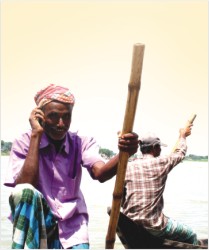 |
| Very few lives have been left untouched by the cellular phone. |
For 39-year-old Mohammad Alamgir, a fishmonger at the Karwan Bazaar Wholesale Market, mobile phones have changed his business practises so much so that now he cannot afford to be without one. “Before we had to wait (in the market) till early morning till the fish came and then based on the number caught, their size and weight we fixed an informal price at which we would sell," he says. "That was hard work, but that was the way it had always been. The problems with that way was first the unreliability-- sometimes the fishermen would not come and we would be waiting for them, they were lured to other markets where they thought they could get a higher price. That was very bad for us.” Ever since mobile phones became cost affective to the average man Alamgir changed his business practices, as he continues, “A few years ago I heard about a trader that purchased a mobile phone for himself and his chief supplier and how it did wonders for his business. I took a risk and decided to do the same, I purchased a mobile phone and persuaded the main supplier to buy one as well and since then my business has turned around. While no one can guarantee sure-fire profits my business has been far more stable since then. I can now call and ask how many fish have been caught and discuss the prices with the other traders. Aside from that I can call other markets and check the prices there, so that I can compete with them. The benefits have been many but the only downside was the fact that it was not very cheap. Seven taka for one minute was a lot for me, but since then prices have come down. Now it is more affordable.”
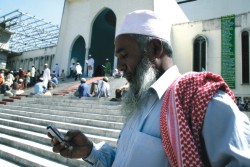 |
| With all call rates plummeting, the cell phone is the most efficient form of communication. |
His story is not an isolated one as many hundreds of thousands of Bangladeshis have benefited from widespread dispersion of mobile phones. But while the number of mobile phone subscribers has increased dramatically (roughly 25 million) since its inception in Bangladesh in 1993, most of it has only occurred in the last few years as the major mobile phone companies went on a price war against each other. The early years of the mobile phone industry in Bangladesh were just as shady as the BTTB is now as for four years one company ran an absolute monopoly in the cellular phone sector. As is common in a monopoly the prices were exorbitant and the mobile phone became a sort of status symbol for the rich and famous rather than a tool for the ordinary people as it is now. The prices of those early phones ran into the lakhs as government nepotism let one company rape the market for all that it was worth.
 |
| The mobile phone has had a profound effect on business around the country. |
Those were truly dark times but then with the second democratically elected government after Ershad, a few more companies threw their hat in with the competition and as a result the prices plummeted dramatically. Dramatic as the fall may have been the prices were still out of the reach of the common man, it was still essentially a rich man's toy. With four companies competing there was only one way the prices could have gone and that was down and slowly as the prices plummeted, the networks began to widen; slowly but surely all of Bangladesh was being brought under the network of cell phone operators. There were two major challenges for the cell phone operators, if they really were to persuade the majority of the population to buy a phone they had to first lower their prices. Not just the price of the sim card but also the call rates which were still very high.
Along with that they had to offer coverage around the country. They got there soon enough and along the way a market leader was established. It has only been in the last few years that the prices of mobile phones have really come down and in those few years the number of cell phone subscribers has gone through the roof. As a result a wider cross-section of people have been able to purchase a phone and along with just being connected there are now added benefits they give to small businesses around the country.
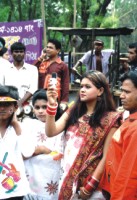 |
Cell phones are an essential accessory for the urban youth. |
42-year-old Mohammad Noman has been running a small shop in the village of Madarsha, Hathazari, Chittagong for the last year and a half. Like every other young man in the locality, he had his heart set on moving to the Middle East and working there to build a life for himself and his family. He lived and worked in Kuwait for a few years before returning to his village and opening up a small store.
Noman has been using the mobile phone for the last 7-8 years. "There was a time when there were only a handful of mobile phones in the village," he says. "The rates were higher than they are now. But I had to use it to be in touch with people I was doing business with in Chittagong, Dhaka and other places of the country."
For him, the mobile phone has actually been a boon. "Now I even place calls abroad and keep myself informed which in turn helps me run my business." "I also appreciate the low rates and the other services that have made my life easier."
Noman says that life would not have been the same if he did not have his mobile phone. "Taking away my phone would probably have me lose all my money," he exclaims. "I would probably incur the same amount of losses if I closed down my store for two months or so."
Noman is a good example of just how much the widespread proliferation of mobile phones has benefited ordinary people. The phone has helped him with his small scale business as well as his personal life. The cellular phone is no longer a device used only by the rich city slickers, Noman, for instance is from the heart of rural Chittagong. It is in fact a tool which has found its way deep into every nook and cranny of Bangladesh and in the process multitudes of people are now connected to each other at the touch of a finger. For an emerging nation such as Bangladesh it has been said that the spread of mobile phones may add 0.6% to the GDP every year. Aside from that it has greatly affected the social structure of the nation as many women often neglected in villages are now empowered with simply one mobile phone.
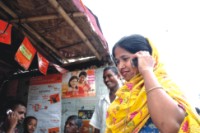 |
Staying connected with loved ones could not get any easier. |
The Village or Polli Phone programme is a programme set up by Grameen Telecom where a phone is provided for a village without access to a fixed telephone line and a woman is given responsibility of it and charges for the use of the phone and pays a proportion back to Grameen Phone. Women are typically awarded ownership of the phone instead of men, as they have turned out to be more reliable as creditors and as a result the social structure is changing ever so slightly in the rural areas, which is a lot for just one small phone to do. Aside from the Polli Phone scheme there are also huge numbers of women who have borrowed money from Grameen Bank and have used the micro credit scheme to purchase mobile phones and then rent them out on a call-by-call basis.
The benefit to the disadvantaged areas of Bangladesh mobile phones have had is immense. Many of the stories that come out of those areas are like that of Farida Begum and her children. Fifty-five-year-old Farida Begum, a housewife, with three married daughters and two sons, one of them in Saudi Arabia, says that the mobile phone is probably one of the greatest human inventions ever. "My daughters are married now and live in places away from here," she explains. "It's not possible for them to come and visit me now and then, and neither is it possible for me to leave my home and move around from one place to another. I speak to my daughters at least every other day now and am always updated with their lives."
Farida's son in Saudi Arabia is in constant touch with his family, especially his mother. "I realise that the rates might be a little high," she says. "But I can always call my son whenever there is a need to and he calls me every other day as well."
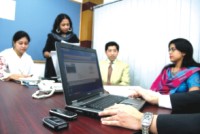 |
Cell phones are part and parcel of corporate life. |
Farida's youngest son, Mohammad Ershad who owns a small printing press near Hathazari says that everyone owns a mobile phone these days. "Even people living in the remotest parts of the villages own mobile phones", he says, "I use mine to stay in touch with my family when I am away at work. Mostly, I used it to stay in touch with my clients and also to keep myself updated with information regarding paper quality, rates and so on."
Mobile phones are thankfully, no longer the status bearers they were before. In 14 years they have transformed the nation in a way one can only imagine. Even the remotest villages are now merely a phone call away. In the process they have altered the social fabric in a small but noticeable way. Women are no longer the blind followers in the pack, they have emerged as leaders. The effect they have had on the country cannot be measured fully but by potentially adding 0.6% to the GDP every year it cannot be discounted either. From the north of the country right down to the south the industry has touched almost everyone in sight and brought a country together in an unimaginable way. Bangladesh is known for its climatic uncertainty, the roads and rivers seemingly work at will and the citizens are held hostage by the weather. In the past news of floods, drought, death and birth were all slow in coming and when passed down through word of mouth, often quite unreliable. With the widespread usage of mobile phones all the information from the village to the city, from the moffasil to the metropolis is only seconds away. From calling a friend over for lunch to calling a farmer for fresh fruit the mobile phone has brought people together and in the words of professor Yunus may just lift us out from poverty.
Copyright
(R) thedailystar.net 2007 |
